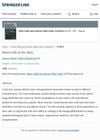Search
for
Sort by
Research
300-330 / 706 results
research Stem Cell Therapy and Hair Loss: Present Evidence and Future Perspectives
Stem cell therapy shows promise for hair loss treatment, but more research is needed to confirm its effectiveness.

research In Vivo Phytotherapy in BALB/c Athymic Nude Mice: Hair Growth Promotion Using Ficus Religiosa L. and Morus Alba L.
Ficus religiosa and Morus alba extracts improved hair growth and follicle regeneration in mice.

research The Role of the Vitamin D Receptor in the Epidermal Stem Cell Response to Wounding
Vitamin D receptor is crucial for skin wound healing.

research The Biology and Genomics of Human Hair Follicles: A Focus on Androgenetic Alopecia
Hair loss in Androgenetic Alopecia is caused by genetics, aging, and lifestyle, leading to hair follicle shrinkage and related health risks.
research Understanding Type 3 Innate Lymphoid Cells and Crosstalk with the Microbiota: A Skin Connection
Type 3 Innate Lymphoid Cells help maintain skin health and balance, and are involved in skin diseases and healing.

research Stem Cells in the Skin
The skin has different types of stem cells that can repair and regenerate tissue.

research Revealing Novel Insights on How Oral Supplementation With Collagen Peptides May Prevent Hair Loss: Lessons From the Human Hair Follicle Organ Culture
Collagen peptides from marine and bovine sources may help prevent hair loss by affecting hair follicle stem cells differently.

research Deciphering the Molecular Mechanisms of Stem Cell Dynamics in Hair Follicle Regeneration
Different stem cells are key for hair growth and health, and understanding their regulation could help treat hair loss.

research Bioactive Compound-Loaded Nanocarriers for Hair Growth Promotion: Current Status and Future Perspectives
Nanocarriers with plant extracts show promise for safe and effective hair growth treatment.

research Adipose-Derived Stem Cell Exosomes Antagonize the Inhibitory Effect of Dihydrotestosterone on Hair Follicle Growth by Activating Wnt/Beta-Catenin Pathway
Substances from fat-derived stem cells can promote hair growth and counteract hormone-related hair loss by activating a key hair growth pathway.

research Topical Finasteride: A Comprehensive Review of Androgenetic Alopecia Management for Men and Women
Topical finasteride might be a good alternative for hair loss treatment with fewer side effects, but more research is needed.

research Cell Therapy for Androgenetic Alopecia: Elixir or Trick?
Stem cell therapies could be a promising alternative for hair loss treatment, but more research is needed to understand their full potential and safety.

research Cold Atmospheric Microwave Plasma Stimulates Dermal Papilla Cell Proliferation by Inducing Beta-Catenin Signaling
Cold Atmospheric Microwave Plasma (CAMP) helps hair cells grow and could potentially treat hair loss.

research Oral Combination Treatment of Gefitinib and Sasam-Kyeongokgo: Synergistic Effects on the NCI-H520 Tumor Cell Line
Gefitinib and Sasam-Kyeongokgo together significantly reduce cancer growth and improve immune response in mice.
research Adipose Mesenchymal Stromal Cell-Derived Exosomes Carrying MiR-122-5p Antagonize the Inhibitory Effect of Dihydrotestosterone on Hair Follicles by Targeting the TGF-β1/SMAD3 Signaling Pathway
ADSC-Exos with miR-122-5p can help treat hair loss by promoting hair growth.

research Cells and Structures Involved in Hair Follicle Regeneration: An Introduction
The document concludes that hair follicle regeneration involves various factors like stem cells, noncoding dsRNA, lymphatic vessels, growth factors, minoxidil, exosomes, and induced pluripotent stem cells.

research CD201+ Fascia Progenitors Choreograph Injury Repair
CD201+ fascia progenitors are essential for wound healing and could be targeted for treating skin conditions.

research Fibrous Scaffolds Potentiate the Paracrine Function of Mesenchymal Stem Cells: A New Dimension in Cell-Material Interaction
Special fiber materials boost the healing properties of certain stem cells.

research Oral Syphilis: Report of Three Cases and Characterization of the Inflammatory Cells
The document concludes that recognizing oral lesions is important for diagnosing syphilis.
research Author Response: Involvement of ILC1-Like Innate Lymphocytes in Human Autoimmunity, Lessons from Alopecia Areata
ILC1-like cells may contribute to hair loss in alopecia areata.
research Decision Letter: Involvement of ILC1-Like Innate Lymphocytes in Human Autoimmunity, Lessons from Alopecia Areata
ILC1-like cells may contribute to hair loss in alopecia areata and could be new treatment targets.

research Thy1 Marks a Distinct Population of Slow-Cycling Stem Cells in the Mouse Epidermis
A specific group of slow-growing stem cells marked by Thy1 is crucial for skin maintenance and healing in mice.

research Proinflammatory Cytokines Regulate Epidermal Stem Cells in Wound Epithelialization
Certain immune system proteins are important for skin healing but can cause problems if there are too many of them.

research Bioactive Anti-Inflammatory Antibacterial Hemostatic Citrate-Based Dressing With Macrophage Polarization Regulation for Accelerating Wound Healing and Hair Follicle Neogenesis
A special dressing called FEA-PCEI can speed up wound healing, reduce scars, and help grow new hair follicles, but only at the right dosage.

research Silk-Inspired In Situ Hydrogel with Enhanced Anti-Tumor Immunity for Photodynamic Therapy in Melanoma and Infected Wound Healing
The silk fibroin-based hydrogel shows promise for treating melanoma and healing infected wounds by killing tumor cells and bacteria, and supporting skin recovery.

research Macrophages Are Necessary for Skin Regeneration During Tissue Expansion
Macrophages are essential for successful skin growth in reconstructive surgery.

research The Developing Immune Network in Human Prenatal Skin
Human prenatal skin develops an immune network early on that helps with skin formation and healing without scarring.

research Significance of Iron Status in Hair Loss in Women
Iron deficiency might contribute to hair loss in women.

research The Effects of Low-Dose Radiation Therapy in Patients With Mild-to-Moderate Alzheimer's Dementia: An Interim Analysis of a Pilot Study
Low-dose radiation therapy may improve brain function in some Alzheimer's patients and is generally well-tolerated.